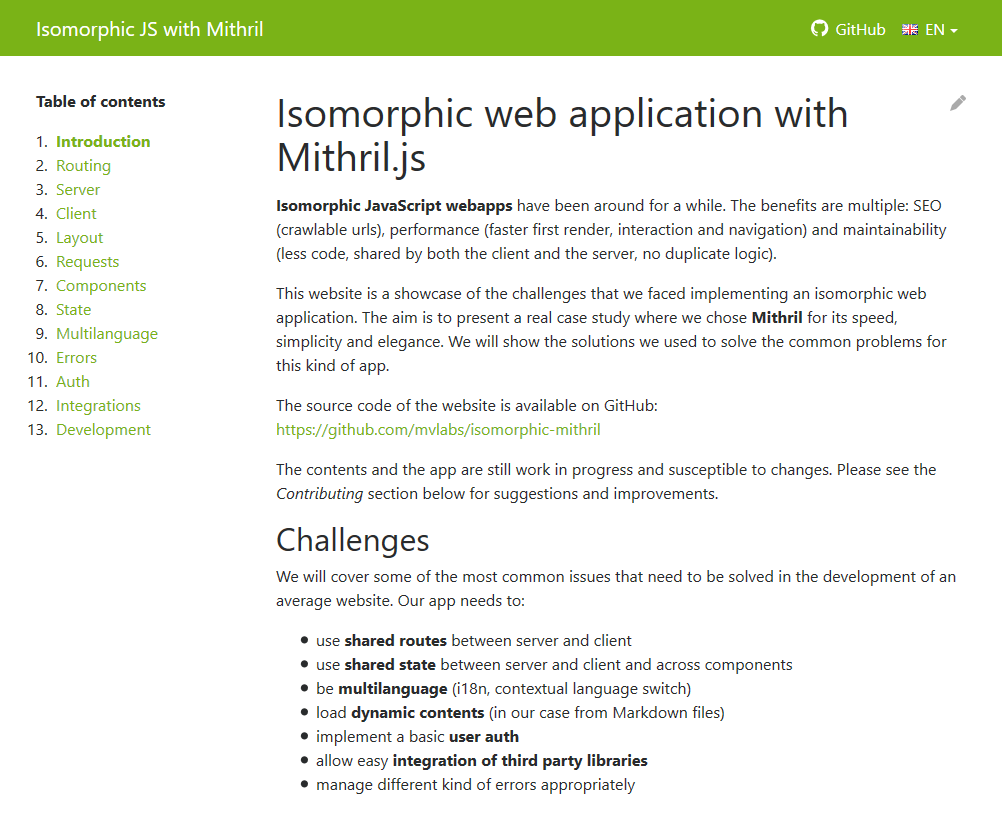Isomorphic JS with Mithril
Andrea Coiutti (@andreacoiutti)
XE One Day - Mestre, 18/11/17


Andrea Coiutti

ISOMORPHIC JS?
REAL CASE STUDY

browser
server sending
HTML pages
API
Conventional app
page?
data?
browser
server sending
HTML pages
API
Conventional app
HTML
JSON
browser
server sending
HTML pages
API
Conventional app
crawlers
page?
data?
browser
server sending
HTML pages
API
Conventional app
crawlers
JSON
HTML
Conventional app
well known and tested technologies
SEO friendly
Conventional app
slow render time
different programming languages / teams?
old school DOM manipulation

jQuery.
browser
server sending
HTML pages
API
SPA
HTML
page?
browser
server sending
HTML pages
API
SPA
JSON
data?
browser
server sending
HTML pages
API
SPA
crawlers
???
HTML
page?
SPA
quick response time
better user experience
hits the server only on first render
modern JS frameworks
SPA
(very) slow initial load
not SEO friendly
browser
server sending
HTML pages
API
Isomorphic app
JSON
data?
page?
HTML
browser
server sending
HTML pages
API
Isomorphic app
JSON
data?
browser
server sending
HTML pages
API
Isomorphic app
crawlers
JSON
data?
HTML
page?
routing
state persistence
view rendering
i18n
resources
time/currency format
BROWSER
SERVER
user events
handling
localStorage,
cookies
logging
static
assets
API
auth

live demo + docs
Advantages:
1. Performance
faster render of the first view
even faster on following views
=
better user experience
Advantages:
2. Maintainability
code shared by server and client
no duplicate logic
=
less code, less bugs
Advantages:
3. SEO availability
server side rendering
good for search engine crawlers
=
full SEO support

Mithril what?

A modern client-side Javascript framework
for building Single Page Applications
Virtual DOM based
Mithril
Download size
Vue + Vue-Router + Vuex + fetch (40kb)
React + React-Router + Redux + fetch (64kb)
Angular (135kb)
Mithril (8kb)


API methods
Performance
Vue (9.8ms)
React (12.1ms)
Angular (11.5ms)
Mithril (6.4ms)
first render time (less is better)
Try Mithril!
- easy to learn
- fun to work with
- great documentation
- nice community


Common
challenges
RENDERING

Risk of cloaking
Client-side rendering
m()
Mithril's hyperscript function
m('div', { class: 'foo' }, 'hello')returns a virtual DOM node (or vnode)
JS object representing the DOM element to be created
<div class="foo">hello</div>selector (required)
attributes object
children array
express any HTML structure using Javascript syntax
Server-side rendering
// use a mock DOM so we can run mithril on the server
require('mithril/test-utils/browserMock')(global);
const m = require('mithril');
const render = require('mithril-node-render');
const view = m('div', { class: 'foo' }, 'hello');
render(view).then((html) => {
// html = '<div class="foo">hello</div>'
})render Mithril views on server side on Node.js
mithril-node-render
ROUTING
Shared routes
unique set of routes
map URI patterns to route handlers
Express and Mithril use same route definition
http://localhost/
http://localhost/:page
http://localhost/:category/:post
http://localhost/:other
Shared routes
http://localhost/#!/hello
http://localhost/hello
change it to pathname strategy
m.route.prefix('');Mithril's router uses hashbang strategy as default
Shared routes
// Mithril base components
const Home = require('./pages/Home.js');
const Login = require('./pages/Login.js');
const NotFound = require('./pages/NotFound.js');
const Section = require('./pages/Section.js');
// ...
// Plain routes (without language prefix)
const plainRoutes = {
'/': Home,
'/login': Login,
'/sections/:key': Section,
// ...
'/:other': NotFound
};
module.exports = plainRoutes;app/routes.js
Components
encapsulate logic into units later usable as an elements
base for making large, scalable applications

Components in Mithril
POJOs
{ }
Plain Old JavaScript Objects
Components in Mithril
// define a component
const MyComponent = {
view: vnode => m('div', vnode.attrs, ['Hello ', vnode.children])
};
// consume it
m(MyComponent, { style: 'color: red;' }, 'world');<div style="color: red;">Hello world</div>const ComponentWithHooks = {
oninit: (vnode) => {
console.log('initialized');
},
oncreate: (vnode) => {
console.log('DOM created');
},
onupdate: (vnode) => {
console.log('DOM updated');
},
onbeforeremove: (vnode) => {
console.log('exit animation can start');
return new Promise(function(resolve) {
// call after animation completes
resolve();
})
},
onremove: (vnode) => {
console.log('removing DOM element');
},
onbeforeupdate: (vnode, old) => {
return true;
},
view: (vnode) => {
return 'hello';
}
}Lifecycle
methods
const ComponentWithHooks = {
oninit: (vnode) => {
console.log('initialized');
},
oncreate: (vnode) => {
console.log('DOM created');
},
onupdate: (vnode) => {
console.log('DOM updated');
},
onbeforeremove: (vnode) => {
console.log('exit animation can start');
return new Promise(function(resolve) {
// call after animation completes
resolve();
})
},
onremove: (vnode) => {
console.log('removing DOM element');
},
onbeforeupdate: (vnode, old) => {
return true;
},
view: (vnode) => {
return 'hello';
}
}Lifecycle
methods
const ComponentWithHooks = {
oninit: (vnode) => {
console.log('initialized');
},
oncreate: (vnode) => {
console.log('DOM created');
},
onupdate: (vnode) => {
console.log('DOM updated');
},
onbeforeremove: (vnode) => {
console.log('exit animation can start');
return new Promise(function(resolve) {
// call after animation completes
resolve();
})
},
onremove: (vnode) => {
console.log('removing DOM element');
},
onbeforeupdate: (vnode, old) => {
return true;
},
view: (vnode) => {
return 'hello';
}
}Lifecycle
methods
const ComponentWithHooks = {
oninit: (vnode) => {
console.log('initialized');
},
oncreate: (vnode) => {
console.log('DOM created');
},
onupdate: (vnode) => {
console.log('DOM updated');
},
onbeforeremove: (vnode) => {
console.log('exit animation can start');
return new Promise(function(resolve) {
// call after animation completes
resolve();
})
},
onremove: (vnode) => {
console.log('removing DOM element');
},
onbeforeupdate: (vnode, old) => {
return true;
},
view: (vnode) => {
return 'hello';
}
}Lifecycle
methods
const MainComponent = {
oninit: (vnode) => {
vnode.state.content = null;
getSomething() // async request, returns a Promise
.then((content) => {
vnode.state.content = content;
});
},
view: vnode => m(Layout, [
m(Header),
m('main', vnode.state.content || m(Loading),
m(Footer)
])
};Data flow
app/pages/MainComponent.js
Data flow
m(Header)
m(Footer)
m(Layout)
m('main')
m(Loading)
const MainComponent = {
oninit: (vnode) => {
vnode.state.content = null;
getSomething() // async request, returns a Promise
.then((content) => {
vnode.state.content = content;
});
},
view: vnode => m(Layout, [
m(Header),
m('main', vnode.state.content || m(Loading),
m(Footer)
])
};Data flow
app/pages/MainComponent.js
const MainComponent = {
oninit: (vnode) => {
vnode.state.content = null;
getSomething() // async request, returns a Promise
.then((content) => {
vnode.state.content = content;
});
},
view: vnode => m(Layout, [
m(Header),
m('main', vnode.state.content || m(Loading),
m(Footer)
])
};Data flow
app/pages/MainComponent.js
Data flow
m(Header)
m(Footer)
m(Layout)
m('main')
Lorem ipsum dolor sit amet, consectetur adipiscing elit, sed do eiusmod tempor incididunt ut labore et dolore magna aliqua. Ut enim ad minim veniam, quis nostrud exercitation ullamco laboris nisi ut aliquip ex ea commodo consequat. Duis aute irure dolor in reprehenderit in voluptate velit esse cillum dolore eu fugiat nulla pariatur. Excepteur sint occaecat cupidatat non proident, sunt in culpa qui officia deserunt mollit anim id est laborum.
const MainComponent = {
oninit: (vnode) => new Promise((resolve) => {
vnode.state.content = null;
getSomething() // async request, returns a Promise
.then((content) => {
vnode.state.content = content;
resolve();
});
}),
view: vnode => m(Layout, [
m(Header),
m('main', vnode.state.content || m(Loading),
m(Footer)
])
};Async components
app/pages/MainComponent.js
const MainComponent = {
oninit: (vnode) => {
vnode.state.content = null;
getSomething() // async request, returns a Promise
.then((content) => {
vnode.state.content = content;
});
},
view: vnode => m(Layout, [
m(Header),
m('main', vnode.state.content || m(Loading),
m(Footer)
])
};Requests
makes XHR (aka AJAX) requests, returns a Promise
m.request()
m.request({
method: 'PUT',
url: '/api/v1/users/:id',
data: {id: 1, name: 'test'}
})
.then((result) => {
console.log(result);
});Requests
make m.request() work server side
global.window.XMLHttpRequest = require('w3c-xmlhttprequest').XMLHttpRequest;server.js
SHARED STATE
State manager
const state = {
sections: {
home: {
title: 'Isomorphic JS with Mithril',
slug: 'index',
content: 'Isomorphic JavaScript webapps have been around...'
},
intro: {
// ...
},
// ...
},
lang: 'en'
};Shared state
m('script', `window.__preloadedState = ${JSON.stringify(state)}`)app/components/Layout.js
<script>window.__preloadedState = {"sections":{...},"lang":"en"}</script>const sharedState = window.__preloadedState || {};app/index.js
AUTH
API
CLIENT
[POST] credentials
[HTTP 200 OK] signed JSON token
credentials
validation
[GET] resource
[HTTP 200 OK] data
token
validation
store token
Token based auth
JWT (JSON Web Tokens)
browser
server sending
HTML pages
API
Isomorphic app
cookies, localStorage
single request
MULTILANGUAGE
Multilanguage
requires changes almost everywhere in the code
resources
server init
routes
client init
views
i18n
Micro library for translations
support for placeholders and multiple plural forms
plays well with VDOM-libraries such as Mithril
translate.js
const translate = require('translate.js');
const messages = {
like: 'I like this.',
likeThing: 'I like {thing}!',
likeTwoThings: 'I like {0} and {1}!',
simpleCounter: 'The count is {n}.',
hits: {
0: 'No Hits',
1: '{n} Hit',
n: '{n} Hits', // default
}
};
const t = translate(messages);
// Simple
t('like') => 'I like this.'
t('Prosa Key') => 'This is prosa!'
// Placeholders - named
t('likeThing', {thing: 'the Sun'}) => 'I like the Sun!'
//placeholders - array
t('likeTwoThings', ['Alice', 'Bob']) => 'I like Alice and Bob!'
// Numerical subkeys (count)
t('simpleCounter', 25) => 'The count is 25'
t('hits', 0) => 'No Hits'
t('hits', 99) => '99 Hits'Integrations
easy integration of third party libraries
on the client side
const Prism = process.browser ? require('prismjs') : null;
const MainComponent = {
oninit: (vnode) => /*...*/,
view: vnode => m(Layout, [
m(Header),
vnode.state.content ? m('section', {
oncreate: () => Prism.highlightAll()
}, vnode.state.content) : m(Loading),
m(Footer)
])
};app/pages/MainComponent.js
THANK YOU!
docs and demo:
http://isomorphic-mithril.mvlabs.it

